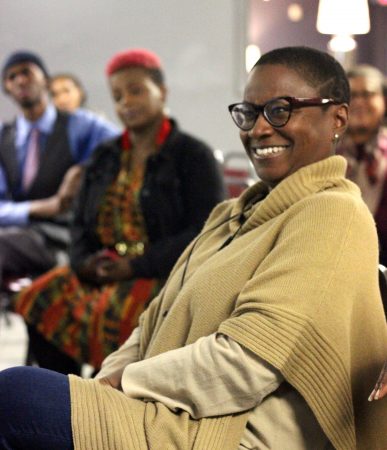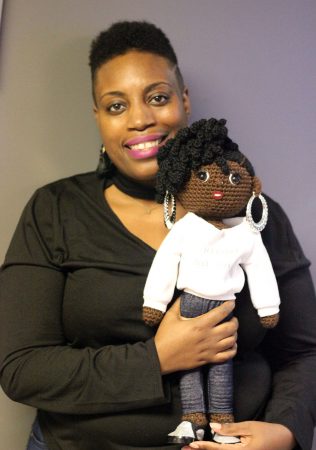
Dr. Yaba Blay, NCCU’s Dan Blue Endowed Chair, teaches during her intro course on women and gender studies. (Staff photo by Jennifer Maxwell)
Dr. Yaba Blay had promised the room full of eagerly awaiting professional black women an evening of “black girl magic,” and she did not disappoint.

Yoga instructor and owner of Yoga 4 Us, Malikia Roberson, listens intently as Dr. Blay answers her question at the event, “An Evening of Black Girl Magic,” on Nov. 8. (Staff photo by Jennifer Maxwell)
In continuance with its mission to increase the position of black people in the community and break down barriers to economic participation in ethnic markets, the Durham Business and Professional Chain hosted its monthly educational seminar at the Phoenix Event Center in Durham on Thursday, Nov. 8.
The seminar, bringing together community members and entrepreneurs of all professions to celebrate black culture, featured N.C. Central University’s Dan Blue Endowed Chair and founder of Professional Black Girl, Dr. Blay, as the evening’s influential speaker on black racial identity within women.
More than 50 women packed into the event space, stirring with excitement and anticipation for Dr. Blay to begin. Immediately greeting her audience with an impassioned tone that would maintain throughout the evening, Dr. Blay assured the women this would be a night of storytelling, rooted in a deep sense of community.
“This evening I’m just going to tell ya’ll some stories because at heart I’m a storyteller,” Dr. Blay said before leading the audience through a series of impactful moments in her life as a black woman. “I have been trying to figure out what it means to be in this dark-skinned, kinky-haired, black woman body, in this world, for a long time. How does this body interact with the world to make meaning and to take meaning?”
Dr. Blay shared her childhood experience of using storytelling when she was confronted with American ignorance. As a 7-year old, she challenged the ignorant questions from classmates about her heritage by reading them her 10-page story about the African Princess Yaba, who did in fact ride upon jeweled elephants and descend from African royalty.
As Dr. Blay reflected on various phases of her journey, the audience responded with sounds of mutual understanding and familiarity. When she spoke about how her Auntie Janet made a fuss over how beautiful her skin was every time they saw one another, and how that positive attention came at a time of adolescence when she most needed affirmation, the audience roared in harmony.
Not long after reflecting on the important role Auntie Janet played on her formative years, Dr. Blay caught sight of the youngest member of the audience — elementary student and clothing designer Taylor Murphy. Showing that same passion and love that Auntie Janet had showered upon her, Dr. Blay instantly left the podium, walked directly to the very back of the room, and embraced the beaming Murphy in a warm hug.
Despite the various backgrounds of the audience members, a celebratory tone interconnected them all in solidarity. They celebrated their individual successes as black women, they embraced their community of black women, and they actively invested their skills back into the black community.

Yoga instructor and owner of Yoga 4 Us, Malikia Roberson, listens intently as Dr. Blay answers her question at the event, “An Evening of Black Girl Magic,” on Nov. 8. (Staff photo by Jennifer Maxwell)
When business-owner Yolonda Jordan first learned of the opportunity to hear Dr. Blay speak about racial identity and the culture of black beauty, she immediately planned to drive from her hometown of Bailey, North Carolina, despite having to catch an early flight to Detroit the morning after the seminar.
“There is no way I am missing this,” Jordan said. “(Dr. Blay) reminds me that I can be me. One-hundred percent me! And that’s okay.”
Jordan, the owner of My Pretty Brown Doll, saw a need in the community for young black girls to have dolls that looked like them, so she created a line of custom-made crocheted black dolls that celebrate black identity.
As the women in the audience shared their own stories and life-lessons with Dr. Blay during an informal question and answer period, a powerful sisterhood emerged. Attorneys, entrepreneurs, caterers, students, and bakers alike, all shared in the magic of the evening.
Yoga instructor and owner of Yoga4Us, Malikia Roberson, shared that it is her mission to bring African-American women into the practice of yoga.
“When you think of yoga, you don’t think of me,” Roberson said to the room of women.
“I do now!” another audience member said without missing a beat and adding to the celebration of professional black women.
“I do my work for black people. But I especially do it for black women and girls,” Dr. Blay said, bringing the night to a close. “Don’t compete with them. Compete with yourself. What is the best that you can be?”